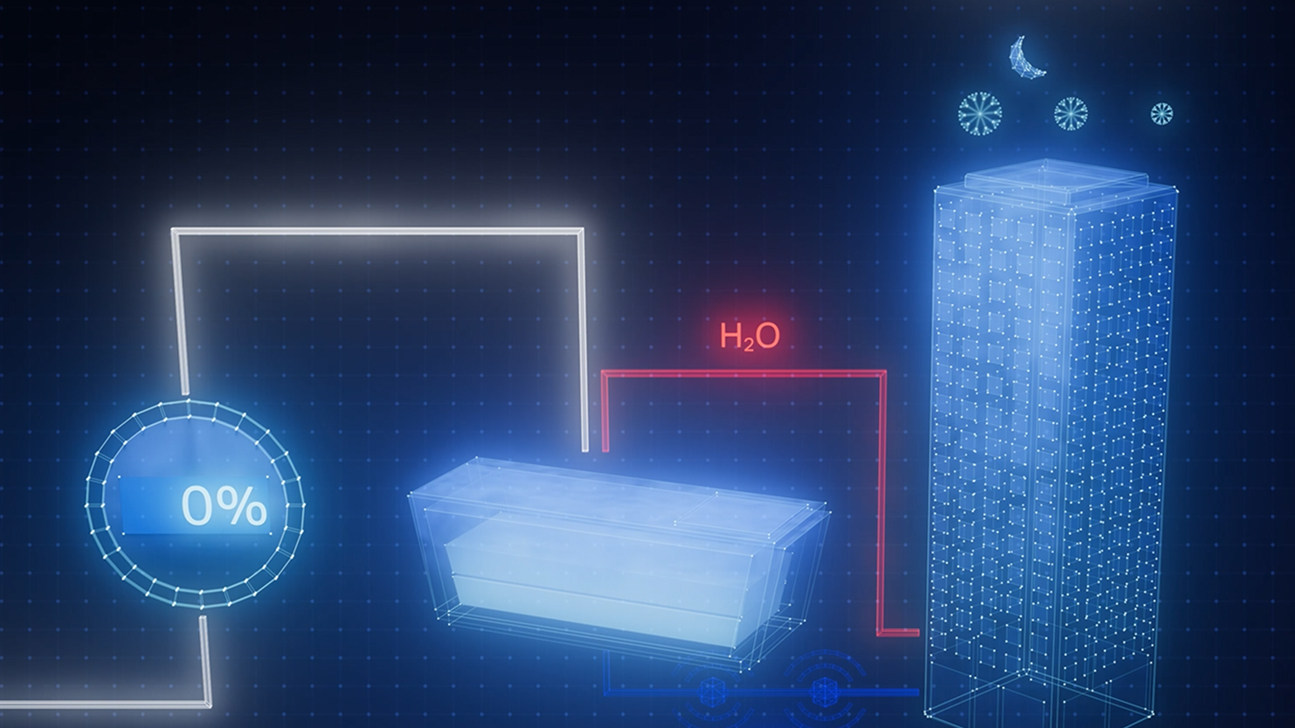Cooling more people with fewer emissions: intelligent, efficient cooling with AI and ice batteries
Thursday, October 30, 2025

The challenge
In hot climates such as Abu Dhabi, cooling demand is not aligned with peak energy generation from solar. This mismatch between solar generation and cooling demand forces reliance on fossil fuels, increasing both costs and carbon emissions. Addressing this imbalance is critical for advancing renewable energy adoption and meeting global sustainability goals.
How can we store excess solar power from the day to cool buildings efficiently at night?
MBZUAI’s solution
Researchers at MBZUAI, led by Associate Professor and Associate Department Chair of Machine Learning, Martin Takáč, are developing an AI-driven energy management system that optimizes the use of ice battery technology – a system that stores energy as frozen water (or another phase shift material) during times of energy surplus when rates are low. When energy demand peaks, the ice (or equivalent material) is used to chill water that is circulated through a cooling system.
The AI model integrates multimodal data from weather forecasts, environmental sensors, and power grid signals to determine when to store or release thermal energy. This data-driven approach continuously adapts to real-world variables such as temperature, building occupancy, and time of year, making it far more responsive than conventional rule-based systems.
What makes it different
Current ice battery systems often operate on fixed schedules that ignore daily fluctuations in energy supply and demand. MBZUAI’s approach uses predictive machine learning and time-series modeling to anticipate changes in both grid load and cooling needs.
“We use multimodal data, including satellite images, time-series data, and information from social networks that relate to the change in seasons, holidays, and even major events that may be happening in a city,” explains doctoral student Nicolás Mauricio Cuadrado Ávila.
This integration of AI and thermal storage sets a new benchmark for smart, adaptive energy management, paving the way for more efficient, low-carbon cooling solutions.
Cooling more people for less
The project is being developed by MBZUAI’s Machine Learning Department, in collaboration with energy experts focused on sustainability in the Gulf region. The system is particularly suited for climates where cooling accounts for a major share of energy consumption, such as the UAE.
“In places where cooling represents a large portion of energy use, ice batteries can provide an efficient solution,” says Takáč. Early simulations suggest significant potential to reduce fossil fuel dependence and lower energy costs while maintaining cooling performance.
By merging AI with energy storage, MBZUAI’s research could transform how cities in hot regions manage energy. Smarter control of ice batteries promises reduced emissions, optimized grid performance, and greater use of renewable power.
In the next few years, MBZUAI aims to pilot this AI + ice battery system across large-scale cooling networks, advancing the UAE’s leadership in sustainable energy innovation.
MBZUAI invites partners in clean energy, smart city infrastructure, and sustainable cooling to collaborate and co-develop applications that bring this technology to scale. If your organization is exploring AI solutions for energy efficiency, MBZUAI welcomes opportunities for partnership.
Contact Martin Takáč at engagement@mbzuai.ac.ae.
- research ,
- innovation ,
- sustainability ,
- energy ,
- ADIPEC ,
- solar ,
- cooling ,
Related
The search for an antidote to Byzantine attacks
A new study from MBZUAI and other institutions tackles malicious and faulty updates in privacy-preserving machine learning.....
Read MoreAI and the silver screen: how cinema has imagined intelligent machines
Movies have given audiences countless visions of how artificial intelligence might affect our lives. Here are some.....
- cinema ,
- art ,
- fiction ,
- science fiction ,
- AI ,
- artificial intelligence ,
Mind meld: agentic communication through thoughts instead of words
A NeurIPS 2025 study by MBZUAI shows that tapping into agents’ internal structures dramatically improves multi-agent decision-making.
- machine learning ,
- neurips ,
- agents ,


